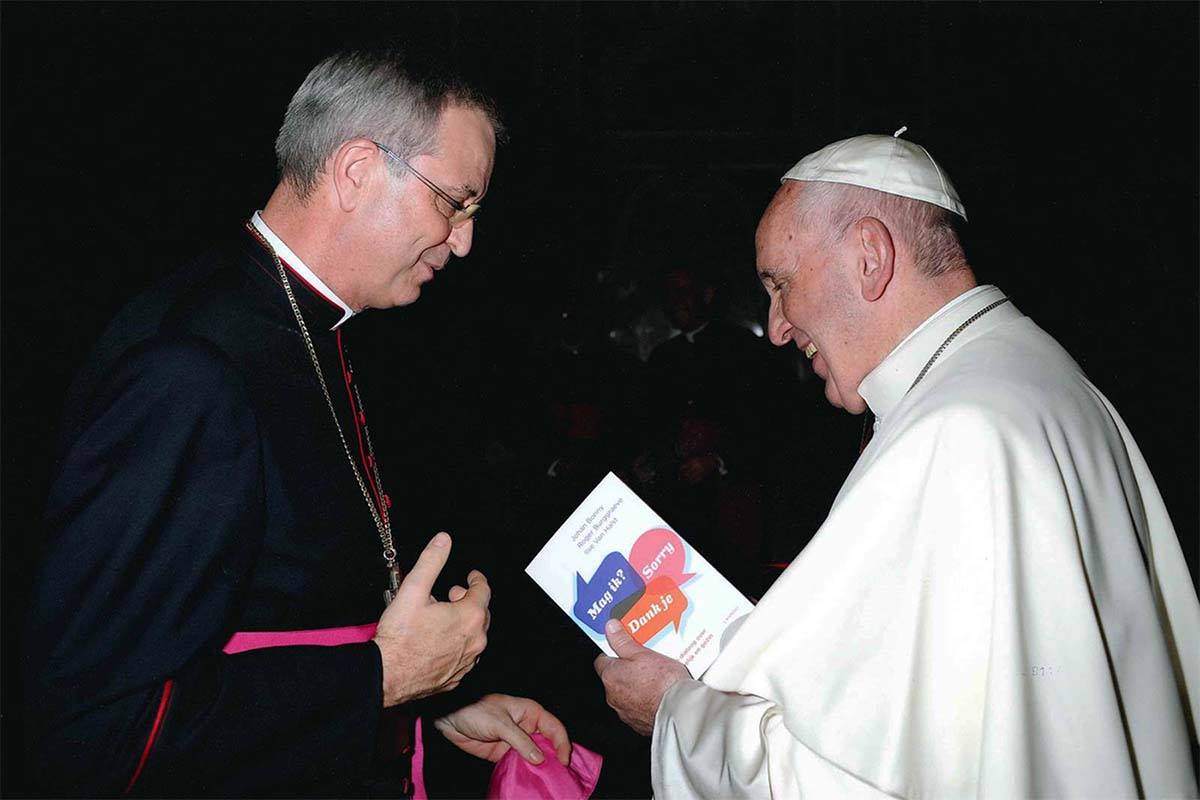In September, the Flemish bishops decided that, from now on, gay couples could celebrate their relationships in Catholic churches. They explained that they had been encouraging their priests and other collaborators to promote recognition and integration. “We want to continue on that path by giving this a more structural character,” the bishops said.
(To clarify: Belgium consists of two main language groups. This is a document by the Flemish-speaking Belgian bishops, not the French-speaking Belgian bishops.)
The decision led to considerable turmoil on blogs and social media. Did this celebration equal a blessing, or did it not? Did the bishops bypass the synodal process? Were they breaking the unity of the Catholic Church or disrespecting Catholic moral teaching? Amid the strong opinions, the facts sometimes got lost. Here, I summarize what happened, offer a positive interpretation and suggest why it’s good (and Catholic) news.
What actually happened
The bishops’ document is short and does three things.
First, it highlights recognition and inclusion. That had been the approach the bishops were promoting. The Flemish bishops feel supported to continue in this direction by Pope Francis and his apostolic exhortation “Amoris Lætitia.”
Second, the bishops announced that they will appoint a “contact person” for LGBTQ people and their families and friends. In doing so, gay people are recognized as part of the body of the church.
Third, the bishops recognize the value of lasting and loving relationships between LGBTQ people and offer a loosely developed liturgy for celebrating those relationships in church—what they call, “a moment of prayer to ask God that He may bless and perpetuate this commitment of love and fidelity.”
A positive reading
The primary objective is this: recognition and inclusion. I like to stress that, for it means that the objective is not to overturn church teaching. Rather, the intention is to appreciate and acknowledge. As the bishops write:
Along the sometimes-complex path of acknowledging, accepting and positively living their orientation, we want to remain close to them [homosexual persons]. Some remain celibate. They deserve our appreciation and support. Others choose to live as a couple, in lasting and faithful union with a partner. They too deserve our appreciation and support. Because this relationship too, although not a Church marriage, can be a source of peace and shared happiness for those involved.
That also means that the juridical and technical question if this is a blessing— yes or no—is a secondary question. The bishops have taken a pastoral, not a juridical, step. In assessing this new development, the warm pastoral welcome must be appreciated first.
Secondly, I’d like to stress that this is a local initiative. As Bishop Johan Bonny of Antwerp stated on the television: We are doing here what needs to be done here. There’s no intention to put pressure on other bishops or to break the unity of the global church. The bishops have listened to the local people of God and discerned that this is the step they should take.
In that discernment, conversations between the Cardinal Jozef De Kesel of Mechelen-Brussels and Willy Bombeek, a committed gay Catholic, played a major role. Those discussions started as early as 2020, long before the synod. In other words, the bishops don’t mean to bypass that process—they had started long before. And what they started is based on listening to the faithful.
As Bishop Johan Bonny of Antwerp stated on the television: We are doing here what needs to be done here.
Thirdly, this is a cautious document. At various instances, it stresses that this not marriage, something that may sound painful to gay couples, for it suggests that their relationship has less depth and is a lesser reflection of God’s love than a “true” marriage. I read this as the bishops trying to respect sensitivities. Again, I would suggest focusing on what has been gained— recognition, inclusion, appreciation—rather than on what has not (or not yet) been achieved.
Finally, it is a short document of barely three pages that leaves several questions unanswered. The same could be said more positively: The bishops leave ample space for further reflection by theologians, canon lawyers liturgists and chaplains.
Why this is a Catholic document
Some criticize the document as abandoning church teaching. Here, I’d like to state the opposite: This is a truly Catholic document. In the first place, the bishops repeatedly refer to “Amoris Lætitia” and they highlight conscience as the ultimate source for moral wisdom. “Amoris” is a very Catholic document, promulgated by Pope Francis, and the concept of conscience and our ultimate moral authority is a very Catholic notion, championed by Saint Thomas Aquinas.
Admittedly, some would quote from other documents and mention other sources for moral wisdom, but that only means there is a variety of possible Catholic perspectives.
Critics of the Flemish document often refer to the 2021 responsum from the Congregation for the Doctrine of the Faith, which stated that gay relationships are objectively disordered and cannot be blessed. Yet, that is not the only Catholic perspective, and Pope Francis has not used these terms. Not only did the pope wonder “Who am I to judge?” he has repeatedly sent letters of support to James Martin, S.J., to encourage his ministry with LGBTQ people.
The Flemish bishops have made it their priority to opt for inclusion and conscience. That is a valid Catholic position.
I would say that this diversity of perspectives simply means that the church is still working out how to relate to gay people. The Flemish bishops have made it their priority to opt for inclusion and conscience. That is a valid Catholic position.
Secondly, since Second Vatican Council, local bishops have been restored to their full dignity (i.e., responsibility). They are shepherds of their flock, not ambassadors of the pope. Now, there is a discussion about what that means and how to manage the tension between the local and the universal, but one cannot simply say that the Belgian bishops have broken the unity of the church.
One could as well say they have been shepherds of their flock. The Flemish-speaking Belgian bishops have not acted on their own account, for they have issued this statement together. In other words, opting for recognition and inclusion is a shared conviction. This is a very Catholic document because it prioritizes salvation over doctrine. It recalls how Jesus would prioritize curing people over keeping the Sabbath and stress mercy over rules.




